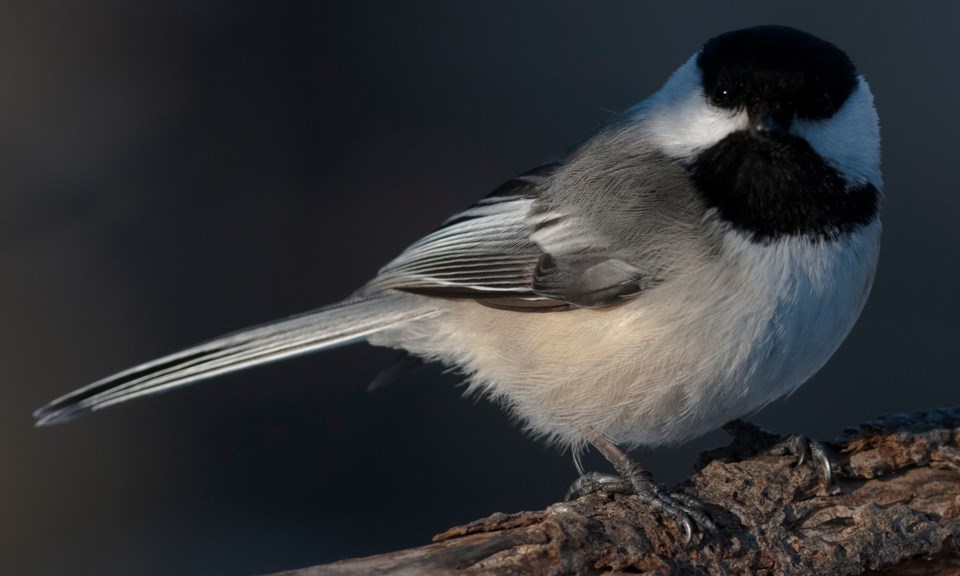About the only time a chickadee remains still is when it's dead, sleeping, or about to become dead. Other than that, they're pretty much a hyper bundle of muscle and feathers.
The weather certainly doesn't seem to bother them, as whether the sun is shining or the cold winds are blowing, they're always flitting to and from the feeder.
There are usually from three to five of the black-masked bandits working our birdfeeder. Sometimes they drop in like a small flurry, as if anxious to gather all they can before moving along, and other times they skulk from the shrubs by the stream to the crab apple tree and then furtively flit to the feeder, snatch and go!
And so it was that my attention was arrested by them the other morning.
Now it takes a bit to grab any attention from me in the morning; I'm getting' older I guess, and it takes about an hour of shuffling around before I can honestly say I'm awake.
As I pawed opened the refrigerator door in search of some white stuff to pour on the crispy brown stuff that's over there somewhere on the table, I suddenly stopped.
Okay, I wonder, what's going on now? Slowly I turn my head to look out the kitchen window at the feeders. Hmm. Nothing of note. In fact nothing there at all. Hmm. Wonder what it was that made me look?
I return to mining through the layers of bowls and jars which populate our 'fridge and discover the milk is about three layers back.
As I stand and shut the door, a glance out the window shows me that something is wrong with the picture. I focus on a chickadee perched on the rim of a feeder. It's not moving. A second bird comes into focus, this one holding onto the side of a large branch. No movement there either.
A bit of scanning and a third bird is located clinging to a branch tip. All look as if sculpted and attached as some kind of subtle lawn ornament.
Ah, now I know what's happening. Danger is nearby! Chickadees normally laugh in the face of danger, "Ha-ha, can't catch me in the deep, thick tangle of branches!" But sometimes, surprise, a predator comes upon them quite unexpectedly. And then it's time for Plan B.
Plan B for these little imps is quite simple really — just stay still. Very still. So still that maybe you won't be noticed, that maybe you'll look like a piece of weathered bark, and that maybe you won't get eaten. Maybe.
I looked up for a hawk in the higher trees nearby. None to be seen. I looked back into the woodlot for a bird of prey that may be as camouflaged as these guys, but again nothing was noted. Well, there has to something out there! Chickadees don't freeze up like this just for fun.
Finally, by pressing my face sideways against the window pane, and looking way, way over to the side of the yard, I found the source of concern — a shrike.
A northern shrike has been frequenting the area all winter, but not on a regular basis.
It just 'drops in' unexpectedly, like an evil character in an old movie (and he's in black and white, too). Shrikes, about the size of a blue jay, love to eat other birds, especially little birds, like, oh, say, a chickadee. Sometimes they eat mice, but the little mammals are tougher to catch and to tear apart.
So here we had a standoff.
The chickadees no doubt caught a flash of movement as the shrike landed nearby, and the shrike probably thought that there should be a chickadee or two hanging around here somewhere.
All parties involved are being quite stubborn about who gets to move first. I turn my head from predator to prey and back again, but all is quite on this avian battle line.
Just as I'm about to get really bored with all this (remember, I have a bowl of cereal waiting for me) two more chickadees come flitting in from across the field. They obviously don't know about the shrike, and are quite unaware of the awkward situation they are flying into.
I turn to the first trio and see that they too are watching the approach of their cousins. A glance at the shrike shows that it has not yet seen the incoming meal. A quick glance back to the feeders — and the original three have vanished.
No flurry of feathers, no frantic aerial pursuits. Just darn good timing as to staying put until the shrike was distracted by the new arrivals. Then they were gone.
The shrike swiveled its head back and forth, obviously confused at this masterful double-play of his prey. He ruffles and realigns his feathers, turns on the branch, and with a jump and a glide is off on another surprise attack, perhaps at the neighbour's feeder.
Morning has broken, the chickadees have survived, and the milk is getting warm from being held in my hand. Time to get on with the day.
